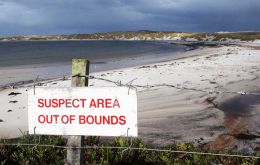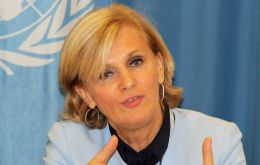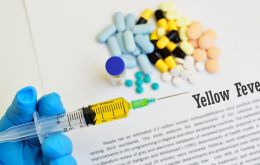MercoPress. South Atlantic News Agency
Health & Science
-
Monday, May 8th 2017 - 17:50 UTC
The Falklands penguins that would not explode

The Falklands and the efforts to clear minefields left by the Argentine invasion in 1982, which have become de facto nature reserves for penguins, will be aired on BBC Radio 4 under the heading of “Listen to Exploding Penguins”, presented by Peter Gibbs and produced by Matthew Teller. The presentation will be Tuesday 9 May at 15:30 UK time.
-
Tuesday, May 2nd 2017 - 22:31 UTC
BAS describes how warm, dry winds weaken Antarctic ice shelves

New research describes for the first time the role that warm, dry winds play in influencing the behaviour of Antarctic ice shelves. Making a presentation at a European conference scientists from British Antarctic Survey (BAS) explain how spring and summer winds, known as föhn winds, are prevalent on the Larsen C Ice Shelf, West Antarctica and creating melt pools.
-
Thursday, April 20th 2017 - 01:57 UTC
Punta Arenas plans to seat a major Antarctica scientific research hub

Chile will build the International Antarctic Center in the southern city of Punta Arenas, meant to become the entering point to the white continent for the world. The Governor of the Magellan region and the Chilean Antarctic, Jorge Flies stated this week that there were 35 projects developing in his jurisdiction, in three important areas.
-
Thursday, April 13th 2017 - 07:17 UTC
Radical increase in water and sanitation investment required to meet development targets

Countries are not increasing spending fast enough to meet the water and sanitation targets under the Sustainable Development Goals (SDGs), says a new report published by the World Health Organization (WHO) on behalf of UN-Water – the United Nations inter-agency coordination mechanism for all freshwater-related issues, including sanitation.
-
Wednesday, April 12th 2017 - 10:27 UTC
Chilean salmon sold in Buenos Aires revealed high contents of antibiotic residue

A study performed by the Institute of Technology of UADE Foundation found that 66% of the salmon fillets imported from Chile that are marketed in the fish farms of the City of Buenos Aires contain remains of antibiotics “that can affect the health of those who consume it ”.
-
Tuesday, April 11th 2017 - 15:55 UTC
Brazil beef exports should return to normal in May, says the industry

Brazil's beef exports should return to normal levels between April and May as the country's efforts to reverse import bans have started to bear fruit in the wake of a food safety scandal that surfaced last month, industry group Abrafrigo said.
-
Monday, April 10th 2017 - 04:55 UTC
Falkland Islands Government appoints Director of Health & Social Services

The Falkland Islands Government has announced the appointment of Mandy Whittingham as the new Director of Health & Social Services. Mandy is a registered nurse and has several qualifications in Religious Studies & Education, Health Education & Health Promotion.
-
Wednesday, April 5th 2017 - 05:30 UTC
UK candidate for WHO Director General, David Nabarro, visits Uruguay

Dr David Nabarro, one of the three candidates for Director General of the World Health Organization (WHO), visited Uruguay 23-24 March. During his stay he met with Health Minister Jorge Basso and Vice Minister Cristina Lustemberg, and with Foreign Minister Rodolfo Nin Novoa, to explain his objectives and his vision for a better WHO, and to hear about Uruguay’s health situation, objectives and challenges.
-
Friday, March 31st 2017 - 07:40 UTC
WHO dispatched 3.5 million doses of yellow fever vaccine for outbreak in Brazil

In response to the yellow fever outbreak currently on-going in Brazil some 3.5 million doses of vaccine from the emergency stockpile were deployed to the country through the International Coordinating Group (ICG) on Vaccine Provision for yellow fever.
-
Saturday, March 25th 2017 - 10:17 UTC
Obamacare bipartisan support turns into Trump's first major legislative defeat

In the aftermath of his first major legislative defeat, President Donald Trump is standing by his team, preaching confidence in House Speaker Paul Ryan, and remains convinced of Obamacare's eventual downfall.